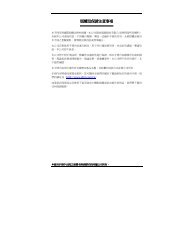Network Working Group J. Reynolds Request for ... - æ¬æ ¡Ftp Server
Network Working Group J. Reynolds Request for ... - æ¬æ ¡Ftp Server
Network Working Group J. Reynolds Request for ... - æ¬æ ¡Ftp Server
Create successful ePaper yourself
Turn your PDF publications into a flip-book with our unique Google optimized e-Paper software.
* <strong>for</strong> servers, not necessarily privileged.<br />
*/<br />
#define IPPORT_RESERVED 1024<br />
<strong>Reynolds</strong> & Postel [Page 62]<br />
RFC 1700 Assigned Numbers October 1994<br />
#define IPPORT_USERRESERVED 5000<br />
Portmap does not allocate ports, the kernel allocates ports. The code<br />
that does this is part of nearly every UNIX system in the world (and<br />
since the BSD code is 'free' it is often the same code). RPC services<br />
ask the kernel to allocate them a port by calling the "bind()" system<br />
call. The parameter they pass is "INADDR_ANY" which means "allocate<br />
me any IP port you want". The kernel does that by looking at all of<br />
the ports that are currently in use and picking one that is not<br />
currently used. The number picked is either less that 1024 if the<br />
process is privledged, or greater than 1024 if the process is not<br />
privledged. After the kernel has allocated a port, the service<br />
registers this allocation with portmap. The portmapper is merely a<br />
registry of previously allocated ports. Note "allocated" here is<br />
being used in the sense that they are used by an open socket, not<br />
assigned a well known name.<br />
The role of /etc/services is to provide an idea to people who are<br />
looking at network traffic as to where a packet may have originated<br />
from or is headed to. For services like finger that have assigned<br />
ports, they can just hard code the port they want into their<br />
executable. (it isn't like it will change, and if they read it from<br />
/etc/services and someone had mistyped the port number it won't<br />
interoperate with clients anyway!)<br />
It is not practical to read the /etc/services file into the kernel to<br />
prevent it from giving out port numbers that are "pre-assigned", nor<br />
is it generally desirable since with the correct ordering of startup<br />
it is completely unneccesary.<br />
Editors Note: This in<strong>for</strong>mation was supplied by Chuck McManis of Sun.<br />
[]













